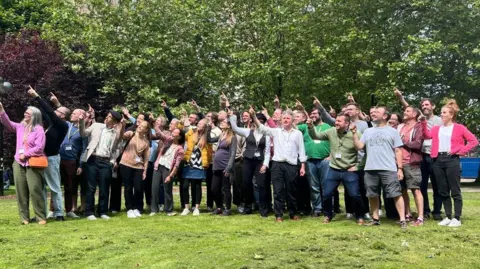'Transformative' investment for health data project
 NurPhoto / Contributor
NurPhoto / ContributorMillions of medical records held by GP surgeries are to be securely analysed for the effectiveness of psychological therapies used for anxiety and depression.
The University of Oxford's OpenSAFELY project has tools that allow researchers to investigate medical files without seeing patients' data or it leaving the NHS.
The Wellcome Trust has awarded the scheme £7m to analyse talking therapies, such as counselling and guided self-help, and £10m to create new techniques to access secure data securely.
Project leader Prof Ben Goldacre said the investment "will be transformative".
The project was established during the pandemic and analysed tens of millions of people's data, giving insights into who was most likely to die from Covid and which groups were missing out on vaccines.
Building on the existing collaboration between the Bennett Institute for Applied Data Science and NHS England, the project will analyse outcome data from patients who have used the talking therapies service.
Outcome data is collected from 98% of people who have a course of treatment.
OpenSAFELY said incorporating this data into its platform would help answer "many vital questions about mental health treatment", including how talking therapies affect long-term health outcomes and the best way to deliver services.
The funding will enable researchers for the first time to analyse the anonymised mental health data in a highly secure setting.
Prof Goldacre, who is also director of the Bennett Institute and who originally trained in psychiatry, said all the data "stays inside the computers" that GP practices themselves have chosen to store patient records.
"But we've also done something really important and different about how researchers and analysts write their code to prepare and analyse the data.
"They never need to interact directly with raw patient records at national scale.
"Instead, the OpenSAFELY platform gives them randomly generated dummy data which ... is just good enough for them to write and to test their code is able to work.
"They press a button inside the system and the code gets sent off into the machine that contains the real patient records, but automated and entirely at arm's length,... and then they get back their tables, their graph, their statistical results."
He added that "radical steps" had also been taken to ensure it was "completely open and transparent".
 OpenSAFELY
OpenSAFELYProf Goldacre said the investment "will be transformative".
"This has the potential to fundamentally change how we deliver mental health care to patients in the NHS.
"In addition, the £10m data infrastructure investment will allow us to drive better use of data across the whole research community."
Prof David Clark, one of the architects of NHS Talking Therapies programme and a clinical advisor to NHS England, said the research infrastructure came "at a crucial time for overstretched mental health services".
You can follow BBC Oxfordshire on Facebook, X (Twitter), or Instagram.
